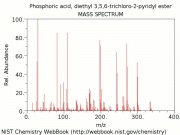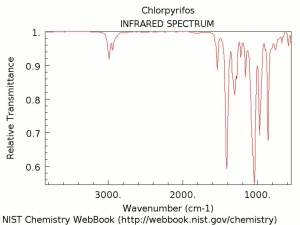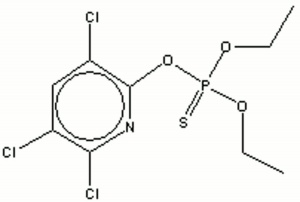Difference between revisions of "Dursban"
Jump to navigation
Jump to search
(username removed) |
|||
| (2 intermediate revisions by 2 users not shown) | |||
| Line 2: | Line 2: | ||
== Description == | == Description == | ||
| − | [Dow AgroSciences] A brand name for an [ | + | [Dow AgroSciences] A brand name for an [[insecticide]] containing [[chlorpyrifos]], an organophosphate. Dursban is widely used for control of [[cockroach|cockroaches]], chinch bugs, spiders, mosquitos, and ticks. It has some residual activity. |
| − | + | [[[SliderGallery rightalign|chlorpyrifosir.jpg~FTIR|chlorpyrifosstr.jpg~Chemical structure]]] | |
== Synonyms and Related Terms == | == Synonyms and Related Terms == | ||
chlorpyrifos; o,o-diethyl o-(3,5,6-trichloro-2-pyridyl) phosphorothioate; organophosphate; Lorsban; Pyrinex; ENT-27311; Dowco 179 | chlorpyrifos; o,o-diethyl o-(3,5,6-trichloro-2-pyridyl) phosphorothioate; organophosphate; Lorsban; Pyrinex; ENT-27311; Dowco 179 | ||
| − | + | == Risks == | |
| − | = | + | * Toxic by inhalation, ingestion, and skin contact. |
| + | * Corrosive to copper and brass. | ||
| + | * Discolors red dyes. | ||
| + | * May leave deposits on nearby surfaces. | ||
| + | * Combustible. Flash point = 115 C Decomposes at 130 C | ||
| + | * Dow AgroSciences: [https://whelehancropprotection.com/images/msds/Dursban%204%20MSDS%20EIRE%20CLP%20May%202014.pdf SDS] | ||
| − | + | ==Physical and Chemical Properties== | |
| − | Soluble in most organic solvents. | + | * Emuslifiable in water. |
| + | * pH = 4.52 in a 10% solution. | ||
| + | * Soluble in most organic solvents. | ||
{| class="wikitable" | {| class="wikitable" | ||
| Line 25: | Line 32: | ||
|- | |- | ||
! scope="row"| Melting Point | ! scope="row"| Melting Point | ||
| − | | 41-42 | + | | 41-42 C |
|- | |- | ||
! scope="row"| Density | ! scope="row"| Density | ||
| − | | 1.027 | + | | 1.027 g/ml |
|- | |- | ||
! scope="row"| Molecular Weight | ! scope="row"| Molecular Weight | ||
| Line 34: | Line 41: | ||
|} | |} | ||
| − | == | + | ==Resources and Citations== |
| − | |||
| − | |||
| − | |||
| − | |||
| − | |||
| − | |||
| − | |||
| − | |||
| − | |||
| − | |||
| − | |||
| − | |||
* ''The Merck Index'', Susan Budavari (ed.), Merck Research Labs, Whitehouse Station, NJ, 12th Edition, 1996 Comment: entry 2242 | * ''The Merck Index'', Susan Budavari (ed.), Merck Research Labs, Whitehouse Station, NJ, 12th Edition, 1996 Comment: entry 2242 | ||
Latest revision as of 12:44, 27 July 2022
Description
[Dow AgroSciences] A brand name for an Insecticide containing Chlorpyrifos, an organophosphate. Dursban is widely used for control of cockroaches, chinch bugs, spiders, mosquitos, and ticks. It has some residual activity.
Synonyms and Related Terms
chlorpyrifos; o,o-diethyl o-(3,5,6-trichloro-2-pyridyl) phosphorothioate; organophosphate; Lorsban; Pyrinex; ENT-27311; Dowco 179
Risks
- Toxic by inhalation, ingestion, and skin contact.
- Corrosive to copper and brass.
- Discolors red dyes.
- May leave deposits on nearby surfaces.
- Combustible. Flash point = 115 C Decomposes at 130 C
- Dow AgroSciences: SDS
Physical and Chemical Properties
- Emuslifiable in water.
- pH = 4.52 in a 10% solution.
- Soluble in most organic solvents.
| Composition | C9H11Cl3NO3PS |
|---|---|
| CAS | 2921-88-2 |
| Melting Point | 41-42 C |
| Density | 1.027 g/ml |
| Molecular Weight | mol. wt. = 35.39 |
Resources and Citations
- The Merck Index, Susan Budavari (ed.), Merck Research Labs, Whitehouse Station, NJ, 12th Edition, 1996 Comment: entry 2242
- Lynda A. Zycherman, J.Richard Schrock, A Guide to Museum Pest Control, FAIC and Association of Systematics Collections, Washington DC, 1988


